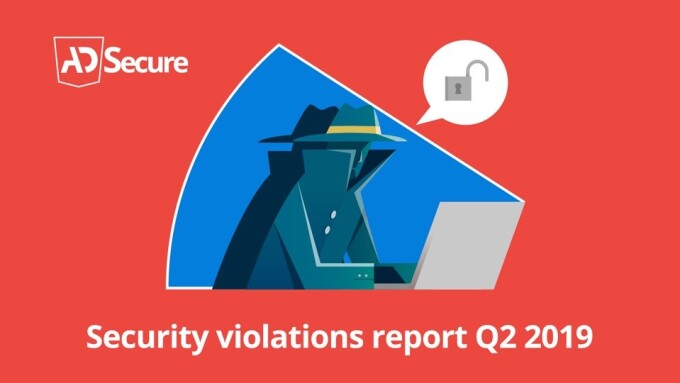DUBLIN — AdSecure has released its Security Violations Report for Q2 2019.
For the report, AdSecure, an ad verification solution used by ad networks, ad operations teams and publishers, analyzed over 200,000 ad campaigns across multiple regions, devices, and browsers for its partners between April 1 and June 30.
The findings provide insight into cybercriminal behavior during Q2: Where they were most prolific, how they delivered their attacks, their malicious weapons of choice, and what AdSecure’s detections revealed to protect end users from malicious ads.
AdSecure carried out a scan to detection ratio and found that out of every 10,000 scans they uncovered 585 detections, including 532 user experience violations and 53 security violations.
The report also examined security violations and user experience violations in the top 10 geos and compared the results with Q1 findings:
- Detections of adware attacks increased by 4,854 percent
- Detections of scareware attacks increased by 727 percent
- Detections of phishing showed an increase of 71 percent
- Detections of malware decreased by 27 percent
The U.K. and Germany saw the biggest jump in security violations increasing by 2.9 percent and 2.1 percent respectively. Japan saw the biggest increase of 3.7 percent for user experience violations.
“Adware is one of the easiest forms of malware to distribute, and is often ignored or goes unnoticed by its victims and is most commonly used for crypto mining or spy tools that watch everything the victim does on their device,” AdSecure’s Product Manager Mat Derval said. “Scareware is a persistent problem and a quick way for criminals to obtain payments from inexperienced victims.”
“Phishing was less prolific compared to Adware and Scareware, and is less effective because victims are more educated in being able to spot this cybercrime,” Derval added. “Specific Malware detections did decrease this quarter [and] one reason could be that fraudsters switched their efforts into Adware and Scareware attacks in Q2.”
Derval noted that even though Malware decreased slightly, in June, AdSecure detected a much higher peak of five times more detections than in April and May.
“This was due to helping one of our clients uncover and keep control of a large scale attack,” Derval said, “by [updating our detection rules engine in real-time to] catch every variation the cybercriminal was trying to submit and spread on their network.”
In AdSecure’s Q1 report, push browser locker detections were by far the biggest violation from a volume perspective, prompting AdSecure’s Sales Manager Bryan Taylor to comment for Q2, “After discovering and classifying the looping push locker mutation, overall browser locker detections peaked in April and continued to decline in May and June.”
“By June detections fell 17 percent [and] thanks to our technology we have stopped tens of thousands of these violations being distributed,” Taylor added. “Since our looping push discovery most browsers have updated their software to block these attacks so we recommend that end users update their browsers to the latest version to finally stamp out this highly intrusive violation.”
The full report can be read here.




